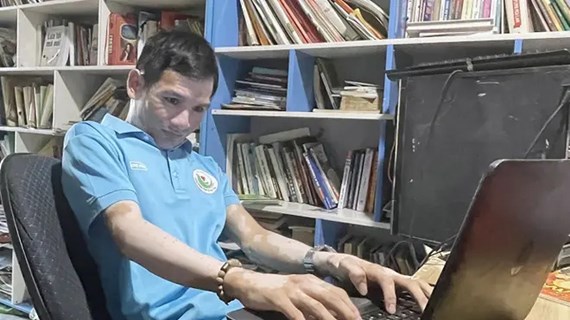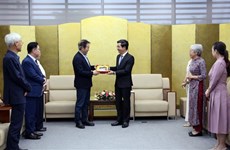Party leader asks for Constitution enforcement
Party General Secretary Nguyen Phu Trong has asked the Committee for
drafting amendments to the 1992 Constitution to ensure the enforcement
of the newly-adopted amended document that is slated to take effect on
January 1, 2014.
Party General Secretary Nguyen Phu Trong has asked the Committee for
drafting amendments to the 1992 Constitution to ensure the enforcement
of the newly-adopted amended document that is slated to take effect on
January 1, 2014.
At a conference in Hanoi on December 26 to review the committee’s activities, General Secretary Trong lauded the committee’s members for their high sense of responsibility, fulfilling duties assigned by the Party, State and people.
He also urged the committee’s members to continue screening and amending the legal system in accordance with the spirit of the Constitution.
Built on over 26 million public opinions and discussions at more than 28,000 conferences and talks nationwide, the leader said the Constitution is a symbol of brainpower of the entire Party, people and armed forces, reflecting strong will and aspirations of a majority of people.
The adoption of new Constitution at the recent sixth session of the 13th National Assembly is a major political and legal event, marking a new stride in the national law-making history, he noted.
At the event, National Assembly Chairman and the Committee’s President Nguyen Sinh Hung expressed his thanks to the Party Central Committee, the members of the Committee for Drafting the amendments to the 1992 Constitution, ministries, agencies, experts, scientists and people from all walks of life for their critical input into the document.
He also requested the Committee’s members to supervise and put the Constitution into the real life.
Established in August 2011, the committee actively studied foreign experience in drafting Constitution and called for public feedback on the amendments.
Divided into 11 chapters with 120 articles (one chapter and 27 articles fewer than the previous version), the amended Constitution clearly states that the Socialist Republic of Vietnam is governed by law and mastered by the people.
It fully specifies political and economic regimes, showing the nature of Vietnam’s economy as a market-based one following the socialist orientations.
The document also highlights culture, science-technology, environment protection, human rights, basic citizens’ rights and obligations, national defence, the State apparatus, the validity and amendments to the Constitution.
On the State apparatus, it basically inherits the State organisation model mentioned in the old version, but better explains the principle that State powers are unified and decentralised to State bodies in the exercise of their legislative, executive and judiciary powers.-VNA
At a conference in Hanoi on December 26 to review the committee’s activities, General Secretary Trong lauded the committee’s members for their high sense of responsibility, fulfilling duties assigned by the Party, State and people.
He also urged the committee’s members to continue screening and amending the legal system in accordance with the spirit of the Constitution.
Built on over 26 million public opinions and discussions at more than 28,000 conferences and talks nationwide, the leader said the Constitution is a symbol of brainpower of the entire Party, people and armed forces, reflecting strong will and aspirations of a majority of people.
The adoption of new Constitution at the recent sixth session of the 13th National Assembly is a major political and legal event, marking a new stride in the national law-making history, he noted.
At the event, National Assembly Chairman and the Committee’s President Nguyen Sinh Hung expressed his thanks to the Party Central Committee, the members of the Committee for Drafting the amendments to the 1992 Constitution, ministries, agencies, experts, scientists and people from all walks of life for their critical input into the document.
He also requested the Committee’s members to supervise and put the Constitution into the real life.
Established in August 2011, the committee actively studied foreign experience in drafting Constitution and called for public feedback on the amendments.
Divided into 11 chapters with 120 articles (one chapter and 27 articles fewer than the previous version), the amended Constitution clearly states that the Socialist Republic of Vietnam is governed by law and mastered by the people.
It fully specifies political and economic regimes, showing the nature of Vietnam’s economy as a market-based one following the socialist orientations.
The document also highlights culture, science-technology, environment protection, human rights, basic citizens’ rights and obligations, national defence, the State apparatus, the validity and amendments to the Constitution.
On the State apparatus, it basically inherits the State organisation model mentioned in the old version, but better explains the principle that State powers are unified and decentralised to State bodies in the exercise of their legislative, executive and judiciary powers.-VNA












